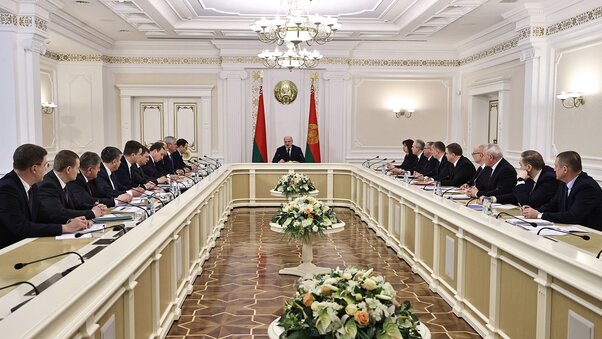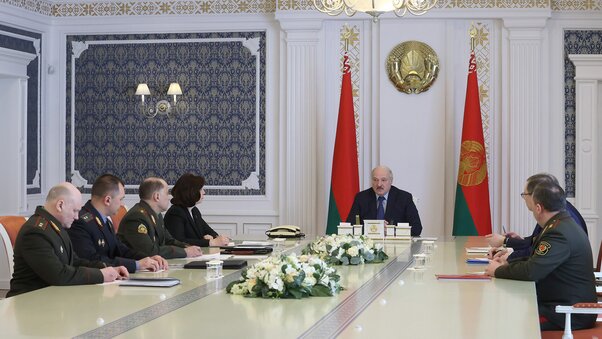Meeting to discuss current situation in Belarus’ agricultural sector
- 8
- 9:41
Thanks to the potential of the agricultural sector, which has been created over the years of the country's independence, the output of the country's main products increased last year, Belarus President Aleksandr Lukashenko said at a meeting held on 29 April to discuss the current situation in the agricultural sector of the country.
According to the head of the state, the previous year was a real test for the system of the world economic relations: the borders were closed, the long lasting trade connections were destroyed and the states and economic unions refused to meet their obligations of mutual support. “I do not rule out that someone needed this. However, the fact that many took advantage of the situation is probably no secret to all the present here,” the President said.
National interests won in this coronavirus test, especially in such a fundamental area of state security as ensuring the priority needs of the population, said Aleksandr Lukashenko.
“In this context, the issue of food security came to the fore. Last spring there were panic moods worldwide: they did not know how to sow and grow crops, they predicted a shortage of food. It happened so. Today the rise in food prices has exceeded 10% across the planet. However, this is precisely the moment when the so-called ‘dictatorship’ and discipline, for which we are not just criticized but reproached, showed their effectiveness. Thanks to the potential that we have developed during the period of independence in the agricultural sector, we ensured the growth of production of the main types of food products last year,” the President said.
At the same time the information from watchdogs about the current state of affairs in cattle breeding is somewhat alarming, the head of state said. Production of livestock and poultry in live weight has slightly reduced. There has been also an increase in mortality and a reduction of livestock. “I think the prosecutor general is well aware that this is the area of responsibility of the prosecutor's office. The loss of livestock is inadmissible if we want agricultural production to grow. I have said this many times: district executive committees should see that if two or three farms perform poorly, the young stock should be removed from these farms and sent to the farms that can provide the needed care,” Aleksandr Lukashenko said.
In his words, these are not only technological issues, which specialists must plan and solve in advance. Production is the basis for successful sales of products and the positive economic situation of the village.
“Do not even ask for money. You have the money. We need to solve the problems and implement the plans we have outlined. We cannot inject significant sums of money in the areas which should earn themselves and replenish the budget. We cannot afford to make up for money losses with anything but production efficiency,” the President stressed.
According to him, the situation in the industry differs by region and even more so by district. “If there are stably performing farms, why are there such striking results given the same weather, financial and other factors? Aleksandr Lukashenko wondered. He added that someone might complain about a shortage of staff or a lack of good equipment. According to the President, all these problems can be solved: during the busy season additional workers can be hired or the existing team can be paid for working two shifts, and the machinery should be treated carefully. “Of course, if you use it around the clock and do not maintain it, a year later you will put it under the fence. It is necessary to treat the equipment carefully. No need to overuse it, drive it into a swampy area when the terms are tight. You'd better work when the soil dries up in three shifts,” the head of state said.
"There are issues with discipline and organization. Sometimes it seems that the more support and trust is given to a region, the worse it performs. We will discuss the example of Vitebsk Oblast in the near future, and God forbid you make no progress there. We have already done everything that you have asked for,” the President said.
The head of state decided to hold a broad-format meeting to deal with these issues and hear out reports of the governors. First of all, he was interested in the reasons that became an obstacle to the dynamic development of the agro-industrial complex and measures which are taken to eliminate them.
“The agricultural industry is specific in that it is at the local level, not in Minsk, where the key factors of success are found: efficient use of material and labor resources, elimination of mismanagement, optimal use of all the potential of the industry. Today we need to make decisions that will set specific tasks for managers at all levels and establish parameters that will subsequently be used to evaluate the results of work,” the President said.
Aleksandr Lukashenko pointed to a number of issues that need to be resolved shortly. He shared his observations of his trip to the Chernobyl-hit regions. On the way there Aleksandr Lukashenko could assess from a helicopter the situation on agricultural land more broadly.
"I resolutely insist on intensifying reclamation efforts. We need to focus our resources on this. We are losing huge areas, thousands of hectares. They are being overgrown with vegetation which will grow into unnecessary trees (we have enough forests). Reclamation, land management, increasing soil fertility are the goals of state importance. This is our job. Therefore, I will ask the minister and the deputy prime minister to deal with these problems," the President said.
He suggested setting up a special reclamation unit in each district. "Reclamation is the most important issue for us. Every region should start dealing with this problem very closely," the Belarusian leader stressed.
Aleksandr Lukashenko said that keeping lands tidy is important. So is their effective use for the development of the livestock sector which needs a fodder base.
Another problem that the head of state drew attention to is a large number of idle homesteads and abandoned houses in some villages. He wants the government to get this issue settled during this year: either to sell homeless houses or demolish them, reclaim the land and involve it agricultural turnover.
At the same time, Aleksandr Lukashenko noted a positive trend: citizens have recently begun buying vacant lots and houses in rural areas more actively.
Similarly, Aleksandr Lukashenko demanded to solve the problem of unkempt former farms: “We have built new animal breeding complexes and abandoned technologically backward production facilities. Now trees are growing on their roofs." The head of state wants this problem to be solved within two or three years stressing that these facilities should not become "monuments of mismanagement" and that freed land should be used for the needs of agriculture. "We need to put everything in order!" the President said.
Aleksandr Lukashenko instructed Chairman of the State Control Committee Vasily Gerasimov to take control of the situation.
The head of state also touched upon the progress in spring field work. He noted that the farms are still behind schedule. The President set the task to sow beets, flax, corn and half of potatoes by 9 May. “9 May is the deadline. On 10 May I will find time to inspect the country (I have developed certain points over the years) and to draw a conclusion about the capabilities of the governors and the people subordinate to them,” the Belarusian leader said.


